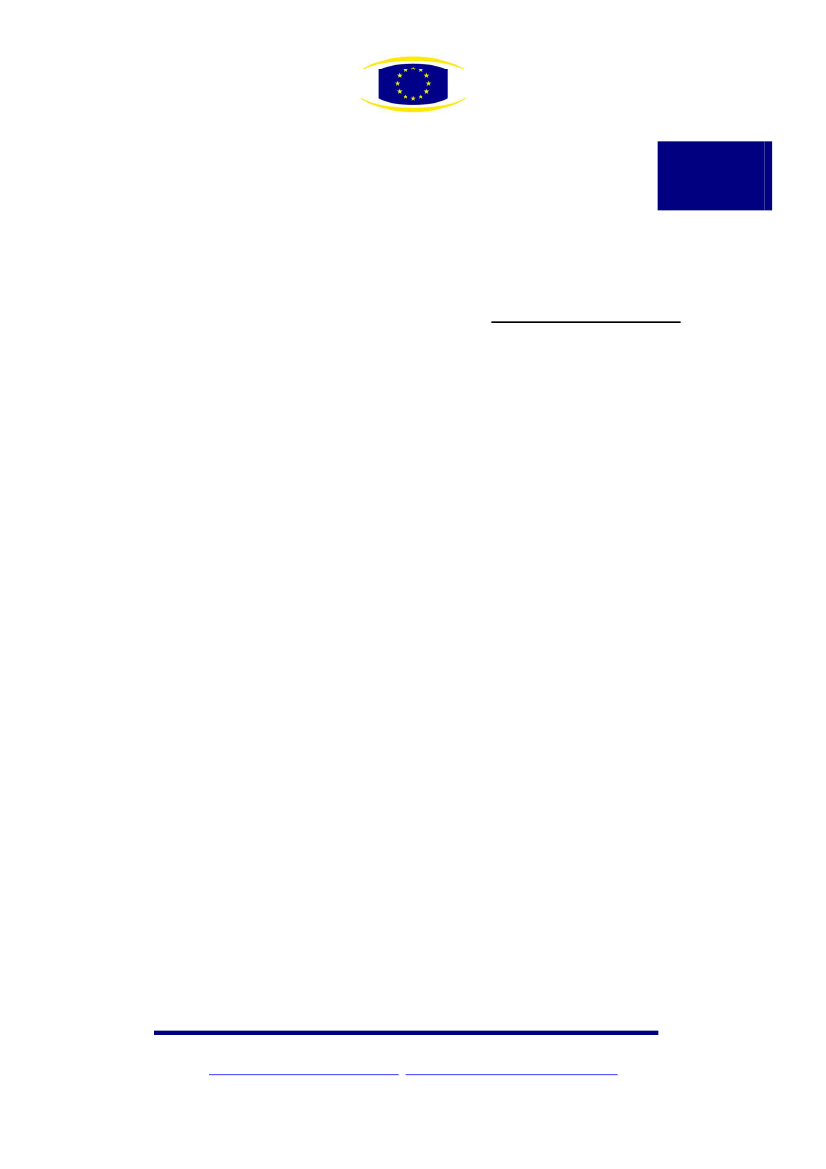Det Udenrigspolitiske Nævn 2013-14
UPN Alm.del Bilag 213
Offentligt
COU CIL OFTHE EUROPEA U IO
EN9542/14(OR. en)PROVISIO AL VERSIOPRESSE 270PR CO 24
PRESS RELEASE3312th Council meeting
Foreign AffairsBrussels, 12 May 2014PresidentCatherine AshtonHigh Representative of the Union for Foreign Affairs andSecurity Policy
PRESSRue de la Loi 175 B – 1048 BRUSSELS Tel.: +32 (0)2 281 9442 / 6319 Fax: +32 (0)2 281 8026
9542/14
1
E
PROVISIO AL VERSIO
12 May 2014
Main results of the Council
UkraineThe Council held an in-depth discussion on the situation in Ukraine. It expressed its alarm at thecontinued efforts to destabilise Eastern and Southern Ukraine.The EU High Representative for Foreign Affairs and Security Policy, Catherine Ashton, said: "TheEuropean Union will not recognise any illegitimate and illegal "referenda". We believe it's veryimportant that all parties concentrate on implementing the Geneva Statement, of which dialogueand the end of violence and provocation are essential elements."The Council also strongly supported the holding of free and fair presidential elections in Ukraine.It took note of recent related declarations from the Russian President and expects support for theholding of these elections on 25 May.The Council held an exchange of views on the situation in Ukraine and on the OSCE SpecialMonitoring Mission with Didier Burkhalter, OSCE Chairperson in Office, and welcomed thepresentation of his proposals for Ukraine.In light of the recent developments and in the absence of any steps towards de-escalation, theCouncil agreed to broaden EU sanctions: It expanded the criteria allowing to impose visa bans andasset freezes on individuals and entities and targeted 13 further persons and two entities with thesemeasures.The EU remains ready to assist Ukraine in the field of civilian security sector reform, includingpolice and rule of law. The Council tasked the European External Action Service to work onelements for a possible civilian CSDP mission in this area with a view to a decision on further stepsat its next meeting.Abductions in igeriaThe Council strongly condemned the indiscriminate killing of hundreds of civilians and theabduction of more than 200 schoolgirls in Borno State, 6igeria. High Representative Ashton said:"We call for their immediate and unconditional release and for those responsible to be brought tojustice." The EU and its member states also offered their support to 6igeria in the resolution of thisdespicable crime and ongoing efforts to protect its citizens: 10 million euros can be made availableto assist 6igeria in its anti-terrorism efforts.
9542/14
2
E
PROVISIO AL VERSIO
12 May 2014
CO TE TS1
PARTICIPA TS................................................................................................................................ 4
ITEMS DEBATEDUkraine................................................................................................................................................. 6Middle East peace process ................................................................................................................. 11Abductions in Nigeria ........................................................................................................................ 12European neighbourhood policy ........................................................................................................ 12OTHER ITEMS APPROVEDFOREIG6 AFFAIRS––––––––––Human rights dialogue with Myanmar/Burma ...................................................................................................... 13EU policy towards the Arctic region ..................................................................................................................... 14EU comprehensive approach ................................................................................................................................. 17Relations with Albania .......................................................................................................................................... 22Relations with Georgia .......................................................................................................................................... 22Relations with Algeria........................................................................................................................................... 22Guidelines on freedom of expression online and offline ....................................................................................... 22Restrictive measures - Côte d'Ivoire...................................................................................................................... 22Framework Agreement with the Republic of Korea.............................................................................................. 23Union for the Mediterranean - Environment and climate change ministerial meeting .......................................... 23
EUROPEA6 ECO6OMIC AREA–41st meeting of the EEA Council .......................................................................................................................... 23
ŸWhere declarations, conclusions or resolutions have been formally adopted by the Council, this is indicatedin the heading for the item concerned and the text is placed between quotation marks.ŸDocuments for which references are given in the text are available on the Council's Internet site(http://www.consilium.europa.eu).ŸActs adopted with statements for the Council minutes which may be released to the public are indicated byan asterisk; these statements are available on the Council's Internet site or may be obtained from the PressOffice.
9542/14
3
E
PROVISIO AL VERSIO
12 May 2014
PARTICIPA TS
High RepresentativeMs Catherine ASHTONBelgium:Mr Didier REYNDERSBulgaria:Mr Kristian VIGENINCzech Republic:Mr Lubomir ZAORÁLEKDenmark:Mr Martin LIDEGAARDGermany:Mr Frank-Walter STEINMEIEREstonia:Mr Urmas PAETIreland:Mr Paschal DONOHOEGreece:Mr Evangelos VENIZELOSSpain:Mr José Manuel GARCÍA-MARGALLO MARFILFrance:Mr Harlem DÉSIRCroatia:Ms Vesna PUSIĆItaly:Ms Federica MOGHERINICyprus:Mr Ioannis KASOULIDESLatvia:Mr Edgars RINKĒVIČSLithuania:Mr Linas A. LINKEVIČIUSLuxembourg:Mr Jean ASSELBORNHungary:Mr János MARTONYIMalta:Mr George VELLAetherlands:Mr Frans TIMMERMANSAustria:Mr Sebastian KURZPoland:Mr Radosław SIKORSKI
High Representative of the Union for Foreign Affairs andSecurity PolicyDeputy Prime Minister and Minister for Foreign Affairs,External Trade and European AffairsMinister for Foreign AffairsMinister for Foreign AffairsMinister for Foreign AffairsFederal Minister for Foreign AffairsMinister for Foreign AffairsMinister of State for European Affairs (Departments of theTaoiseach and Foreign Affairs and Trade)Deputy Prime Minister and Minister for Foreign AffairsMinister for Foreign Affairs and CooperationSecretary of State for European AffairsFirst Deputy Prime Minister and Minister for Foreign andEuropean AffairsMinister for Foreign AffairsMinister for Foreign AffairsMinister for Foreign AffairsMinister for Foreign AffairsMinister for Foreign AffairsMinister for Foreign AffairsMinister for Foreign AffairsMinister for Foreign AffairsFederal Minister for Europe, Integration and ForeignAffairsMinister for Foreign Affairs
9542/14
4
E
PROVISIO AL VERSIOPortugal:Mr Bruno MAÇÃESRomania:Mr Titus CORLĂȚEANSlovenia:Mr Karl ERJAVECSlovakia:Mr Miroslav LAJČÁKFinland:Mr Erkki TUOMIOJASweden:Mr Carl BILDTUnited Kingdom:Mr William HAGUEState Secretary for European AffairsMinister for Foreign Affairs
12 May 2014
Deputy Prime Minister, Minister for Foreign AffairsDeputy Prime Minister, Minister for Foreign AffairsMinister for Foreign AffairsMinister for Foreign AffairsFirst Secretary of State, Secretary of State for Foreign andCommonwealth Affairs
Commission:Mr Štefan FÜLE
Member
9542/14
5
E
PROVISIO AL VERSIOITEMS DEBATEDUkraine
12 May 2014
Ministers held an exchange of views with Didier Burkhalter, OSCE Chairperson in Office, on thesituation in Ukraine and on the work of the OSCE Special Monitoring Mission. The Counciladopted the following conclusions:"1.The European Union stands firm in upholding Ukraine's unity, sovereignty, independenceand territorial integrity and calls upon Russia to do likewise. The EU is alarmed by thecontinued efforts by pro-Russian separatists to destabilise Eastern and Southern Ukraine.Continued seizure of public buildings, kidnappings, killings and violation of mediafreedom by illegal armed groups is unacceptable and must stop. The EU will not recogniseyesterday's nor any future illegitimate and illegal "referenda".The tragic events in Odessa of 2 May with many dead and injured must be thoroughlyinvestigated and all those responsible brought to justice. The Council encourages thecoverage of this investigation by the Council of Europe's International Advisory Panel as away to ensure its independence and transparency.2.The EU strongly supports the holding of free and fair Ukrainian Presidential elections on25 May, and calls on all parties to do so, in order to overcome the crisis and allow theUkrainian people to choose their own future. The Council takes note of the recentdeclarations from the President of the Russian Federation regarding the Presidentialelections in Ukraine and expects support for the holding of these elections on 25 May2014. Ukrainian officials and voters should be unimpeded in preparing for the elections,and all presidential candidates should be ensured safe and secure conditions to campaignfreely across the whole country. To this end, the Council encourages the presidentialcandidates to agree on a compact on electoral conduct. The Council welcomes thedeployment of the OSCE/ODIHR observation mission in which the EU Member Stateswill actively participate.The Council encourages continuation of efforts by the Ukrainian authorities to reach out toall regions of Ukraine within the framework of the envisaged national dialogue proposedby the Ukrainian government, including the Government's steps towards inclusive all-Ukrainian dialogue on the constitutional reform process. The rights of persons belonging tonational minorities need to be fully ensured in line with the relevant standards of theCouncil of Europe.
9542/14
6
E
PROVISIO AL VERSIO3.
12 May 2014
The EU reconfirms its full commitment to the Geneva Joint Statement of 17 April oninitial concrete steps to de-escalate tensions and restore security for all citizens, and callson all parties involved in the Geneva meeting of 17 April to fully implement it. TheCouncil welcomes the efforts taken so far by the Ukrainian authorities to this end,including by working towards constitutional reform and decentralization in a broadnational dialogue and proposing an amnesty law for those who will peacefully leave thebuildings they have seized in Eastern Ukraine. The Council encourages further work to thisend. The Council also calls on the Russian Federation to take effective steps with regard tofulfilling the commitments taken in Geneva. The Council lends its support to a swiftconvening of a next meeting at ministerial level in the Geneva format in order to ensurefull implementation of the Statement with the assistance of the OSCE.In this context, the Council held today a fruitful exchange of views with the Chairman inOffice of the OSCE, Didier Burkhalter. The Council welcomes the presentation of theproposals by the OSCE Chairmanship for Ukraine as well as of the Chairman'sexplanations regarding its implementation. As part of the EU's efforts in the crisis, theCouncil welcomes today's visit of President Van Rompuy to Kyiv. Furthermore, the HighRepresentative and Member States will continue undertaking the necessary contacts withall stakeholders involved in order to bring forward a political solution to the crisis.The European Union reiterates its demand to Russia to call back its troops from theUkrainian border and to immediately withdraw the mandate of the Federation Council touse force on Ukrainian soil. It also condemns declarations and visits of high officialsengaged in supporting illegal attempts at separatism and thus contributing to heighteningtensions in Ukraine and other States in the region. The Council condemns any attempt tocircumvent the sanctions regime. The EU calls upon all sides for restraint and for an end toviolence and provocations. The EU encourages the Ukrainian authorities to maintain theirmeasured approach in pursuing law and order operations and calls on all sides to theconflict to contribute further to reducing tensions.The EU commends the work already undertaken by the OSCE and its Special MonitoringMission, and encourages it to ensure effective operations throughout Ukraine, includingassistance in the implementation of the Geneva Joint Statement. The Council takes note ofthe OSCE roadmap and fully supports the efforts undertaken by the OSCE and its CiO tocontribute to de-escalating and stabilising the situation through concrete steps includingthe establishment of round tables while ensuring Ukrainian ownership. The EU and itsMember States will continue to provide support to the Special Monitoring Mission and callon all other OSCE participating States to do the same. The Council welcomes the rapidexpansion of the Mission to the maximum number of monitors allowed under its mandate,calls for its rapid deployment, and looks forward to the Memorandum of Understandingrapidly coming into force. It encourages the OSCE to continue its support to the efforts ofthe Ukrainian authorities to develop a national dialogue. The Council reiterates theconcerns expressed by representatives of the OSCE and the Council of Europe aboutcurrent restrictions on their ability to observe the situation in the area of human rights,including of persons belonging to national minorities, in Crimea. The Council alsoencourages Ukraine to immediately develop a national disarmament programme togetherwith OSCE specialists targeting all illegally armed groups throughout the country and toend all illegal occupation of public buildings and squares.
4.
5.
6.
9542/14
7
E
PROVISIO AL VERSIO7.
12 May 2014
The EU welcomes the release of the eight unarmed international military observers underthe OSCE Vienna Document, as well as of the Ukrainian military personnel accompanyingthem, who had altogether been held hostage in Slovyansk for more than a week, andexpresses its gratitude to all those who have contributed to this positive development. Thisshould now be followed by the release of all other hostages still being held by illegalarmed groups in Eastern Ukraine.The Council recalls its readiness to assist Ukraine in the field of civilian security sectorreform, including police and rule of law. In this regard, it welcomes the PoliticalFramework for Crisis Approach in Ukraine, submitted by the High Representative inresponse to its conclusions of 14 April. As a next step, the Council tasks the EEAS toprepare a Crisis Management Concept for a possible civilian CSDP mission in this fieldwith a view to a decision on further steps at its next meeting. The Council underlines theimportance of coordination and complementarity with OSCE and other internationalactors.In light of the recent developments and in the absence of any steps towards de-escalationthe Council has agreed to expand the criteria allowing individuals and entities to be subjectto visa ban and asset freeze. This will notably allow for the possible listing of naturalpersons responsible for actively supporting or implementing actions or policies whichundermine the territorial integrity, sovereignty and independence of Ukraine, or stability orsecurity in Ukraine, or which obstruct the work of international organisations in Ukraine,and natural or legal persons, entities or bodies associated with them, or legal persons,entities or bodies in Crimea or Sevastopol whose ownership has been transferred contraryto Ukrainian law, or legal persons, entities or bodies which have benefited from such atransfer. The Council has decided to add a new group of individuals and entities to the listof persons, entities and bodies subject to restrictive measures.The Council notes that the preparatory work by the Commission and Member States isunderway on possible targeted measures, as requested by the European Council in March,so that further steps can be taken should events require.The European Union will pay particular attention to all parties' attitude and behaviourtowards the holding of free and fair Presidential elections when deciding about possiblefuture measures.
8.
9.
10.
The EU reiterates its strong condemnation of the illegal annexation of Crimea andSevastopol by the Russian Federation and will not recognise it. The EU notes with regretthe presence of President Putin at the military parade in Sevastopol on 9 May. The Councilwelcomes the Commission’s evaluation of the legal consequences of the annexation ofCrimea and looks forward to the Council and the Commission continuing their work with aview to the swift implementation of proposals contained therein. These consequencescould include but not be limited to economic, trade, and financial measures. The Councilcalls on UN member states to consider similar measures in line with UNGA Resolution68/262.
9542/14
8
E
PROVISIO AL VERSIO
12 May 2014
The Council expresses its utmost concern about the deteriorating situation of the humanrights situation in Crimea, including the refusal of the right of the leader of the CrimeanTatars Mustafa Dzhemilev to enter Crimea, as well as the warning issued by the de factoprosecutor of Crimea that the national representation of Crimean Tatars Mejlis may bedeclared illegal for "extremist actions".11.The Council reiterates the EU's commitment to sign the remaining provisions of theAssociation Agreement with Ukraine, including the Deep and Comprehensive Free TradeArea, as soon as possible after the presidential elections on 25 May. The Council reiteratesthe importance of the Autonomous Trade Preferences which entered into force in April, asa temporary measure of support to Ukraine and a step leading towards the signing,provisional application and implementation of the provisions on the DCFTA.The Council welcomes the trilateral energy talks between Russia, Ukraine and the EU,launched in Warsaw on 2 May, aimed at safeguarding the security of supply and transit ofnatural gas to and through Ukraine on the basis of a transparent regime. Both sides, despitedifferences between them, expressed their desire to discuss all open issues with the aim offinding a solution by the end of this month. The Council encourages Ukraine and Russia tofind a comprehensive negotiated agreement ensuring energy supply to Ukraine on the basisof a fair and transparent market price. In this context, the Council underlines theimportance of continuing energy sector reforms in Ukraine.The Council also welcomes the signature of a Memorandum of Understanding andFramework Interconnection Agreement between Eustream and Ukrtransgaz enabling gasflows from Slovakia to Ukraine, which complements the already existing Hungarian andPolish reverse flow capacities, and which shows the EU's strong commitment in support ofUkraine's energy security sector. This is an important first step to diversify Ukraine’ssources of gas supply and to contribute to greater energy security in Eastern Europe andeffective interconnections with and within the European Union as a whole. The Councilrecalls the Conclusions by the European Council on 20-21 March 2014 calling on theCommission to conduct an in-depth study of EU energy security.
12.
9542/14
9
E
PROVISIO AL VERSIO13.
12 May 2014
The European Union welcomes the IMF Executive Board decision to approve a two-yearStand-By Arrangement (SBA) for Ukraine of USD 17.1 billion. The authorities’ economicprogramme supported by the Fund aims to restore macroeconomic stability, strengtheneconomic governance and transparency, and launch sound and sustainable economicgrowth, while protecting the most vulnerable. The approval of the SBA with fulfilment ofthe prior actions, enables the immediate release of USD 3.19 billion, with about USD 2billion being allocated to budget support. While reiterating its strong support to Ukraine'seconomic and financial stabilisation, the Council also welcomes the signing by theEuropean Commission of the Memorandum of Understanding on the new EUR 1 billionMacro-Financial Assistance (MFA) loan programme to Ukraine. The Council looksforward to the release of the first tranche of the two MFA loan programmes worth EUR600 million, when all remaining steps will be taken by the Ukrainian Government and theEuropean Commission. The Council reiterates that the Ukrainian Government mustimplement the reforms it has signed up to, including the fight against corruption. TheCouncil welcomes the adoption of a new State Building Contract of EUR 355 million,accompanied by a EUR 10 million Civil Society Support Programme, and looks forward tothe signature of the Financing Agreement at the occasion of the Ukrainian Governmentvisit to the European Commission on 13 May. "
9542/14
10
E
PROVISIO AL VERSIOMiddle East peace process
12 May 2014
The Council discussed the state of play in the Middle East peace process and adopted the followingconclusions:"1.The EU is extremely concerned at recent developments related to the peace process. TheEU has fully supported and praises US peace efforts deployed by Secretary of State Kerryand his team. The extensive efforts deployed in recent months must not go to waste.A negotiated two-state solution remains the best way to resolve the conflict once and forall. The EU regrets that despite US efforts, greater progress has not been made by theparties to date in the talks. The EU urges the parties to use the coming weeks to find thecommon ground and political strength needed to resume this process and to make thenecessary bold decisions. The EU remains determined to do all it can to support that goal,including through the offer of a Special Privileged Partnership, which will ensureunprecedented economic, political and security support for both parties in the event of afinal status agreement.The European Union recalls previous Council conclusions which have laid down its visionfor a two-state solution resulting in an agreement on all final status issues, ending allclaims, and fulfilling the legitimate aspirations of both parties. A one state reality wouldnot be compatible with such aspirations.The EU calls on all sides to exercise maximum restraint and to avoid any unilateral actionwhich may further undermine peace efforts and the viability of a two-state-solution, suchas continued settlement expansion. The European Union will continue to closely monitorthe situation and its broader implications, and will act accordingly.The EU has consistently supported intra-Palestinian reconciliation on clear and certainterms. The EU looks forward to continuing its support, including through direct financialassistance, for a possible new Palestinian government composed of independent figuresthat commits to the principles set out in President Abbas' speech in Cairo on 4 May 2011.Such a government should uphold the principle of non-violence, and remain committed toachieving a two-state solution and to a negotiated peaceful settlement of the Israeli-Palestinian conflict accepting previous agreements and obligations, including Israel’slegitimate right to exist. The EU's engagement with a new Palestinian government will bebased on its adherence to these policies and commitments. Reconciliation on these termsis an important element for the unity of a future Palestinian state and for reaching a two-state solution and a lasting peace. The EU welcomes the prospect of genuine democraticelections for all Palestinians.The EU underlines that Mahmoud Abbas, as President of the PLO, remains fully in chargeof the negotiation process and is mandated to negotiate in the name of all Palestinians andthat the peace negotiations can and must be resumed."
2.
3.
4.
5.
6.
9542/14
11
E
PROVISIO AL VERSIOAbductions in igeriaThe Council adopted the following conclusions:
12 May 2014
"The European Union is deeply concerned about the recent terrorist attacks in northern Nigeria andappalled by the suffering caused to the population.The Council strongly condemns the indiscriminate killing of hundreds of civilians and theabduction of more than 200 schoolgirls in Borno State. These acts represent an attack againsthuman rights and dignity. The European Union calls for the immediate and unconditional release ofthe school girls and for those responsible to be brought to justice.The European Union and its Member States offer their support to Nigeria in the resolution of thisdespicable crime and its ongoing efforts to protect its citizens and defeat terrorism in all its forms,in full respect of human rights. The EU will work to end the culture of impunity for the use ofsexual violence both as a tool and a side effect of conflict worldwide. The EU supports the intentionof the UN Security Council to consider appropriate measures against Boko Haram."European neighbourhood policyDuring lunch, ministers discussed the future of the European neighbourhood policy, withneighbouring countries in both the south and the east.
9542/14
12
E
PROVISIO AL VERSIOOTHER ITEMS APPROVEDFOREIG AFFAIRSHuman rights dialogue with Myanmar/Burma
12 May 2014
The Council adopted the following conclusions on the establishment of a human rights dialoguewith Myanmar/Burma:"1.The Council recalls the adoption in 2001 of the European Guidelines on human rightsdialogues, revised in 2008.The Council recognizes the importance of further strengthening the relationship betweenthe European Union and Myanmar/Burma by establishing an EU-Myanmar/Burma HumanRights dialogue, as foreseen in the Council Conclusions on the Comprehensive Frameworkfor the European Union's policy and support to Myanmar/Burma of 22 July 2013 andagreed during the EU-Myanmar/Burma Task Force held on 13-15 November 2013.The Council endorses the establishment of a human rights dialogue with Myanmar/Burmaalong the mutually agreed modalities, which are annexed to these conclusions."
2.
3.
For full details, clickhere.
9542/14
13
E
PROVISIO AL VERSIOEU policy towards the Arctic region
12 May 2014
The Council adopted the following conclusions on an EU policy towards the Arctic region:"1.The Council welcomes the Joint Communication of the Commission and the HighRepresentative of June 2012 on Developing a European Union Policy towards the ArcticRegion, which sets out the path for the EU's increased engagement in the Arctic. TheCouncil also takes note of the important considerations of the European Parliament in itsresolution of 12 March 2014 on the EU strategy for the Arctic. The Arctic is a region ofgrowing strategic importance and the Council agrees that the EU should now furtherenhance its contribution to Arctic cooperation. Rapid climate change, a major concern andcause of fundamental changes in the Arctic, combined with increased prospects foreconomic development in the Arctic region call for the EU to engage actively with Arcticpartners to assist in addressing the challenge of sustainable development in a prudent andresponsible manner.Recalling the Conclusions of 8 December 2009, the Council welcomes the significantrange of activities the EU is already undertaking in the region across the EU policyspectrum, in particular a valuable contribution to Arctic cooperation through research (€20million/year, 2007-13), regional and cross-border investment (€1.14 billion, 2007-13) andcooperation with our partners in the fields of environment, transport, energy, and maritimesafety. The Council supports the view that the EU action should now be strengthened by:supporting research and channelling knowledge to address the challenges of environmentaland climate changes in the Arctic; acting with responsibility to contribute to ensuringeconomic development in the Arctic based on sustainable use of resources andenvironmental expertise; intensifying the EU's constructive engagement with Arctic States,indigenous peoples and other partners to find common solutions to challenges that requirean international response. The EU should seek to strengthen its support for the theprotection of the Arctic environment through its policies regarding for example climatechange, air pollutants including black carbon, biodiversity and fisheries.The Council confirms that the EU should enhance its contribution to Arctic cooperation, inconformity with international instruments, notably the United Nations Convention on theLaw of the Sea.The Council supports the intention of the Commission and the High Representative tointensify dialogue on Arctic matters with all the EU’s Arctic partners.
2.
3.
4.
9542/14
14
E
PROVISIO AL VERSIO5.
12 May 2014
The Council recognises the Arctic Council as the primary body for circumpolar regionalcooperation. The Council re-affirms its agreement to and its strong support for the observerstatus of the EU in the Arctic Council, and notes that the EU is committed to work activelyas an observer of the Arctic Council and contribute to its activities. The Council urgesCanada to use the current positive momentum in EU-Canada relations to help resolve theremaining issue so as to allow for the full implementation of the Kiruna decision regardingthe EU's observer status as soon as possible before the next EU/Canada summit. TheCouncil agrees that this would facilitate an even more effective EU contribution to Arcticcooperation. The Council also stresses the important role played by EU Member States inthe Arctic Council as members and observers in promoting cooperation in the Arctic inaccordance with their respective status.The Council recognises the efforts of the Arctic states to develop joint approaches and bestpractice to address the potential environmental impact and safety concerns related toincreasing activities in the region. In this context, the collaboration of the EU and itsagencies with Arctic Council bodies in addressing common Arctic challenges should bestrengthened.The Council supports EU's efforts for increased dialogue with indigenous peoples of theArctic region, and welcomes the annual EU Arctic Indigenous Peoples' Dialogue meetings.The EU should also explore appropriate ways of ensuring that the representatives of Arcticindigenous peoples are informed and consulted on EU policies that may affect them.A better understanding of the developments underway in the Arctic is vital to ensure asustainable future for the region and its peoples. The Council therefore supports anenhanced contribution by the EU to Arctic research, including monitoring and observationefforts, and to the sharing and dissemination of information about the Arctic. The Councillooks forward to the results of the preparatory action to conduct a Strategic Assessment ofdevelopment in the Arctic co-ordinated by the Arctic Centre of the University ofLapland with a network of European research institutions of Arctic expertise. The Councilrequests the Commission to consider the options proposed by this project to establish anEU Arctic Information Centre to promote efficient access to Arctic information, tofacilitate dialogues and to communicate on Arctic issues. The Council stresses theimportance of the alignment of Arctic research programmes in the EU in dialogue withother partners active in Arctic research. The Galway statement on Atlantic and ArcticOcean research cooperation between the EU, the United States and Canada of 24 May2013 is a further step in this direction.
6.
7.
8.
9542/14
15
E
PROVISIO AL VERSIO9.
12 May 2014
The Council encourages the Commission and Member States to continue their effortsaiming at the swift agreement within the International Maritime Organisation on amandatory "Polar Code". Such a code would set out a range of measures and requirementsto improve and strengthen maritime cooperation and safety and prevent pollution,including as regards cruise passenger ships. The Council takes note of the Cooperation onAeronautical and Maritime Search and Rescue in the Arctic and Cooperation on MarineOil Pollution, Preparedness and Response in the Arctic agreements signed by the MemberStates of the Arctic Council. The Council also invites the Member States and theCommission, with the technical and scientific assistance of the European Maritime SafetyAgency, to support the work of the Arctic Council on emergency preparedness, preventionand response measures, as well as on following up on the recommendations on maritimesafety from the 2009 Arctic Marine Shipping Assessment.With respect to the gradual opening, in the years to come, of trans-oceanic Arctic routesfor shipping and navigation, the Council reiterates, the importance of respectinginternational law principles, including the freedom of navigation and the right of innocentpassage.The Council notes the resource policy developments in the Arctic states including in theBarents Region. The EU should pursue long-term partnerships and policy dialoguescontributing to securing access to, and promoting safe and sustainable management of rawmaterials and renewable natural resources.The Council confirms its support for the further development of the Northern Dimensionpartnerships’ work in the European Arctic, in particular as regards environmental activitiesas well as the development of the transport connections in the region, including newmaritime routes. The Council values the practical work of the Barents Euro-Arctic Councilin this regard.The Council supports strengthening the partnership between the European Union on theone hand, and Greenland and the Kingdom of Denmark on the other which aims atpromoting the sustainable development of Greenland and the diversification of theeconomy. The partnership also encourages an enhanced dialogue and cooperation onglobal and Arctic issues.The Council invites the Commission to ensure that Arctic-relevant programmes financedby the EU under the 2014-2020 multi-annual financial framework, meet the developmentneeds of local populations and offer better opportunities for circumpolar cooperation andresearch as well as Arctic economic development.The Council requests the Commission and the High Representative to keep it regularlyinformed on the progress in implementing the Communication of June 2012. The Councilfurthermore requests the Commission and the High Representative to present proposals forthe further development of an integrated and coherent Arctic Policy by December 2015. Aspart of this exercise, the Council encourages the Commission to ensure effective synergiesbetween the various EU funding instruments in the Arctic region."
10.
11.
12.
13.
14.
15.
9542/14
16
E
PROVISIO AL VERSIOEU comprehensive approachThe Council adopted the following conclusions on the EU comprehensive approach:"1.
12 May 2014
The European Union and its Member States can bring to the international stage the uniqueability to combine, in a coherent and consistent manner, policies and tools ranging fromdiplomacy, security and defence to finance, trade, development and human rights, as wellas justice and migration. This contributes greatly to the Union’s ability to play a positiveand transformative role in its external relations and as a global actor. In December 2013,the European Council called for further steps to improve the efficiency and effectiveness ofthe EU’s comprehensive approach. The Council welcomes the presentation of the JointCommunication by the High Representative and the European Commission on “The EU’sComprehensive Approach to External Conflict and Crises”1as an important step in thisprocess. In this context, the Council recalls the Council Conclusions of November 2007 onSecurity and Development2, the Council Conclusions of December 20113and of November20134on CSDP and the Conclusions from the European Council of December 2013.5The Council stresses that the comprehensive approach is both a general working methodand a set of concrete measures and processes to improve how the EU, based on a commonstrategic vision and drawing on its wide array of existing tools and instruments,collectively can develop, embed and deliver more coherent and more effective policies,working practices, actions and results. Its fundamental principles are relevant for the broadspectrum of EU external action. The need for such a comprehensive approach is most acutein crisis and conflict situations and in fragile states, enabling a rapid and effective EUresponse , including through conflict prevention.The Council notes that the operationalization of the principles and proposals of the JointCommunication and these Council Conclusions is a joint undertaking, and a sharedresponsibility for EU institutions and services as well as for Member States, in capitals andon the ground. In this context, the Council also recalls the provisions in the EU Treaty onconsistency in external action and with other policies, and the responsibility of the Counciland the European Commission to cooperate to that effect. In this context, the Councilstresses the role of the High Representative, who is also one of the Vice Presidents of theEuropean Commission.
2.
3.
JOIN(2013) 30 finalDoc 15097/07Doc 17991/11Doc 15992/13Doc EUCO 217/1317
9542/14
E
PROVISIO AL VERSIO4.
12 May 2014
The Council notes that the starting point for the EU's comprehensive approach must beearly, coordinated and shared analysis of each country and/or regional specific context, theconflict dynamics and the root causes of a crisis situation. This early joined-up analysisshould in particular build on existing mechanisms and processes and systematically bringtogether all relevant domains of EU external action, including diplomacy, security,development and, as appropriate, humanitarian assistance, justice and migration, atheadquarters and on the ground. EU Delegations, Member States’ representations and EUSpecial Representatives all have a central role in contributing to this joint analysis andmaking recommendations for EU action, including in the field of conflict prevention. EUDelegations, in particular, have a key role to play, drawing on their expertise on a range ofissues, including on security and defence issues where appropriate, and also engagingMember States’ representations.The EU's policies and priorities should follow from common strategic objectives and aclear common vision of what the EU collectively wants to achieve in its external relationsor in a particular conflict or crisis situation. The Council notes that the regional strategiesdeveloped for the Horn of Africa, the Sahel and most recently the Gulf of Guinea havebeen valuable in framing the EU's engagements across many policy areas. In a similar vein,thematic work on cyber and maritime security is also being taken forward. The Councilwould welcome the continued proactive preparation of such regional and thematicstrategies to frame the EU's comprehensive response to new political developments andchallenges, notably concerning the EU’s neighbourhood. Similarly, the work on JointFramework Documents (JFDs), outlining the broad range of EU interests and priorities inspecific countries or regions, should be taken forward as soon as possible, including infragile and conflict-affected states.The Council stresses the key importance of early warning and conflict prevention to reducethe risk of outbreak or recurrence of violent conflict and human suffering, also recallingthe EU Programme for the Prevention of Violent Conflicts and the 2011 CouncilConclusions on Conflict Prevention. The Council welcomes the progress achieved so far tobetter integrate the EU's early warning capacities, inter alia through the development of anEarly Warning System. It looks forward to a global roll-out of this process before the endof 2014 and encourages the use of the early warning system reporting across theinstitutions. The step from early warning to early action is pivotal in mitigating the risks ofoutbreak and recurrence of conflicts, and therefore must be fast and decisive. The Councilalso recalls the 2009 "Concept on Strengthening EU Mediation and Dialogue Capacities"and welcomes the work undertaken by the institutions and Member States in the area ofmediation as well as other recent initiatives to strengthen capacity or take forward the EU'sengagement in these areas. In addition, the Council takes positive note of the establishmentof the European Institute of Peace (EIP) as an additional independent organisation in thefield of conflict mediation. The resources offered by the EIP in a flexible manner shouldfurther enhance the capacities available to the EU in this field. The Council alsoencourages closer cooperation and coordination of the various situation and emergencymanagement centres of the Union and Member States.
5.
6.
9542/14
18
E
PROVISIO AL VERSIO7.
12 May 2014
The Council underscores the need for the EU to better, earlier and more systematically linkup its political engagement, its CSDP missions and operations, its developmentcooperation and assistance, and other relevant domains of EU action, in particular incountries or conflict situations where the EU deploys multiple actors, instruments andinterventions. The Council stresses that the strategically coherent use of the EU'sinstruments and policies – simultaneously or in sequence – is necessary to effectivelyaddress the root causes of a conflict or crisis. In the context of crisis management, theCouncil reiterates the important role of CSDP, including through its civilian and militaryexpertise and civilian-military synergies, as an essential element in the EU'scomprehensive approach. The Council stresses the need to utilise the full potential of thePolitical Framework for Crisis Approach (PFCA) in line with the existing Suggestions forCrisis Management Procedures.A comprehensive approach should also enable rapid EU action as required. The Councilalso underscores the need to continue to strengthen the ties between CSDP and the areas ofFreedom, Security and Justice (FSJ) and more effectively develop synergies betweenCSDP actions with FSJ actions as well as actions carried out in other EU domains.
8.
The Council notes that the impact of CSDP missions and operations is enhanced when partof a broader EU strategy. Information about and analysis of the conflict and crisis context,including on the ongoing overall EU engagement, should feed into the planning,preparation, implementation and review phases of CSDP missions and operations. TheCouncil also stresses the need for earlier and more coordinated planning for a smoothtransition from one form of EU engagement to another, in particular regarding transitionfrom short- or medium-term activity to longer-term development cooperation, and fromCSDP missions and operations to other forms of EU engagement, to ensure that theachievements of EU action can be sustained. The ongoing work on transition strategiesshould therefore be taken forward as a matter of priority. In this context, the Council alsostresses the key principle of local ownership and the need for sustainable results. Finally,the Council also underlines the importance to make use of lessons learned from previousoperations, missions and programmes.The Council underlines that the comprehensive approach applies to all phases of theconflict cycle, including prevention, early warning, crisis management, stabilisation andlonger-term peace-building and development cooperation. Its results are often only reachedand sustained in the long term. The Council recalls the 2007 Council Conclusions onSecurity and Development and the importance of peace and security for development, andvice versa. It also notes that fragility and conflict hamper sustainable development andpoverty reduction, create or aggravate humanitarian crises, and can provide a fertilebreeding ground for instability and may trigger migratory flows.
9.
9542/14
19
E
PROVISIO AL VERSIO10.
12 May 2014
The Council notes that the objectives of EU development cooperation remain those set outin the Lisbon Treaty, the European Consensus on Development and the Agenda forChange. It welcomes the progress made in the context of the EU's programming processfor the period 2014-20 to further reinforce synergies between development programmingand the EU's overall policies and notes that in fragile or conflict-affected states,programming and joint programming must be conducted in accordance with, inter alia, theprinciples of the New Deal for Engagement in Fragile States, also building on relevantfragility assessments. It notes the need to further enhance the effectiveness and results ofEU development policies and programmes, also in line with the principles of the GlobalPartnership for Effective Development Cooperation. The Council also notes the ongoingdiscussions in the OECD/DAC and in the context of the post-2015 framework ondevelopment financing, including on ODA.The Council recalls the Conclusions from the European Council of December 2013 asregards the importance of ensuring the greatest possible coherence between the Union’sand Member States’ actions to support partner countries and regional organisations,including in the context of security sector reform, through providing training, advice,equipment and resources where appropriate, so that they can increasingly prevent ormanage crises by themselves.The Council also reaffirms that humanitarian aid must be provided in accordance with thehumanitarian principles and international humanitarian law, solely on the basis of needs ofaffected populations, in line with the European Consensus on Humanitarian Aid.The point of departure for EU policy and action must always be the country or regionalcontext, taking into account country and region-led processes, and the political realities andneeds on the ground. This is where we face and deal with security threats, crisis situationsand development challenges. EU Delegations together with EU Member StatesRepresentations have a key role to play in supporting a coherent, coordinated,comprehensive and effective EU approach, in particular on issues relating to joint analysis,coordinated programme implementation, and the preparation and sharing of politicalreporting. Co-location of EU actors in the field should also be considered whereverfeasible. The progress made in taking forward joint programming in the EU's developmentcooperation provides a good model for how to link up the efforts of EU institutions andMember States in a comprehensive approach at the country-level.The Council notes that the EU should reinforce its cooperation with others and coordinateits comprehensive approach with the efforts and engagement by key international partnerssuch as the UN, NATO, OSCE, AU, other regional organizations and bilateral partnersengaged in a given conflict or crisis situation, with a view to increase operationaleffectiveness, with due respect to the institutional framework and decision-makingautonomy of the EU. The Council stresses the importance of local ownership and localpartners. The Council also highlights the value of the knowledge and contributions of civilsociety, such as NGOs, think tanks and academia, as well as the private sector.
11.
12.
13.
14.
9542/14
20
E
PROVISIO AL VERSIO15.
12 May 2014
For the comprehensive approach to work, these policies and this common strategic visionneed to be translated into concrete action, improved working practices across the EUinstitutions, services and Member States, and tangible results. In the context of the EU'scomprehensive approach, the Council therefore commits itself to reinforce its efforts onrelevant existing processes and initiatives, including by implementing key actions outlinedin the Joint Communication and these Council Conclusions, and calls on the Commissionand the EEAS to do likewise.In particular, the Council stresses the need to implement the Resilience Action Plan,address financing gaps between emergency aid and long-term development resources,particularly in protracted crises, conflicts and post-conflict situations, continue to deliveron EU joint programming policy commitments, take forward the initiative to support thirdstates and regional organizations in crisis situations to enable them to increasingly preventor manage crises by themselves, address challenges relating to the smooth transitioning ofCSDP missions and operations, take forward commitments to Policy Coherence forDevelopment (PCD). The Council also calls to further enhance a rights-based approach,encompassing all human rights, reinforce the work on issues relating to the protection ofcivilians, to women and children in armed conflict and to the fight against sexual violencein armed conflicts, remain engaged in the work towards an ambitious post-2015 frameworkwith an important place for peace and security issues, and build on its Conclusions ofDecember 2013 on the recent EEAS review to continue to improve the way we work, useour resources and deliver together.In this context, the Council also invites the High Representative and the Commission toimmediately commence work to present an action plan to Member States before the end ofthe first quarter of 2015. This action plan should outline how key actions set out in theJoint Communication and these Council Conclusions, in close cooperation with EUMember States, and based on concrete country and regional cases, will be taken forward,implemented and reported, with identified lead structures. This action plan will beregularly reviewed and progress will be assessed with a view to regular progress reports,the first one to be delivered in 2015."
16.
17.
9542/14
21
E
PROVISIO AL VERSIORelations with Albania
12 May 2014
The Council adopted the European Union's position for the sixth meeting of the Stabilisation andAssociation Council with Albania, to take place on 12 May 2012 in Brussels.The Council also adopted decisionsto adapt the Stabilisation and Association Agreement between theEU and Albania in order to take account of the accession of Croatia to the European Union.Relations with GeorgiaThe Council agreed to the conclusion of a protocol to the Partnership and Cooperation Agreementwith Georgia on a Framework Agreement between the European Union and Georgia on the generalprinciples for the participation of Georgia in Union programmes.Relations with AlgeriaThe Council adopted the EU position for the 8th meeting of the EU-Algeria Association Council, tobe held in Brussels on 13 May 2014.Guidelines on freedom of expression online and offlineThe Council adopted EU human rights guidelines on freedom of expression online and offline. Formore information, seepress releaseandguidelines.Restrictive measures - SomaliaThe Council made technical changes to the EU restrictive measures against Somalia so as to takeaccount of UN Security Council resolution 2142 (2014).Restrictive measures - Côte d'IvoireThe Council approved the annual review of EU restrictive measures against Côte d'Ivoire. Itupdated information in relation to two persons on the list and agreed that there were no moregrounds for keeping one person on the list.
9542/14
22
E
PROVISIO AL VERSIOFramework Agreement with the Republic of Korea
12 May 2014
The Council approved, on behalf of the European Union, the conclusion of the FrameworkAgreement between the European Union and its member states and the Republic of Korea. Thisfollows the consent given by the European Parliament on 16 April 2014.Union for the Mediterranean - Environment and climate change ministerial meetingThe Council adopted the position of EU and its member states on the draft declaration of the Unionfor the Mediterranean ministerial meeting on environment and climate change. The meeting willtake place on 13 May 2014 in Athens.For more information on the meeting, clickhere.EUROPEA ECO OMIC AREA41st meeting of the EEA CouncilThe Council established the European Union's common position for the 41st meeting of theEuropean Economic Area Council, to take place in Brussels on 13 May 2014.
9542/14
23
E























